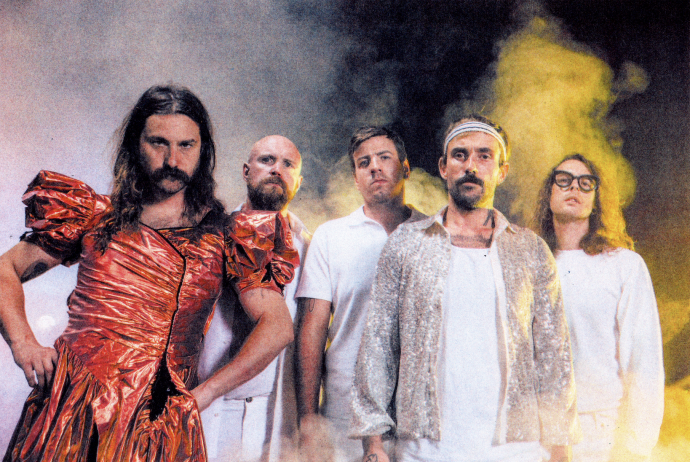Featured image: Sonic PR
Ahead of their three-night residency at the Apollo in December, music journalist Leah Small takes a look at the evolution of IDLES across their five studio albums.
With fists raised and a rambunctious energy like no other, self-proclaimed ‘angry’ ensemble IDLES burst forth from Bristol in 2009, possessing a raw and unapologetic sound that resonated with the masses- from the youthful audiophiles to the disenchanted punks.
IDLES didn’t hit their stride until 2017, with the release of their first album Brutalism launching them to critical acclaim. Brutalism not only serves as a triumphant punk record, but provides a harsh and unwavering declaration of intent and promise. Both vehement and unshielded, Joe Talbot and his collective defy the conventions of a debut album. It grips the necks of listeners with a gritty and intimidating rage, all whilst possessing an intense, uncomfortable vulnerability and protest.
Beginning with the pleading wails of a woman, the opening track ‘Heel/Heal’ combines abrasive soundscapes and aggressive percussion with a strong undercurrent of fragility and nakedness. Continuous chants of ‘I’m not saying that I don’t like you’ invites listeners with an air of unity and camaraderie. The subsequent tracks echo Talbot’s persuasive and cathartic presence, tongue-in-cheek lyricism and biting social commentary.
‘Mother’ salutes not only Talbot’s late mother, but echoes the sound of titans such as Joy Division and Bauhaus, whose shoes IDLES are eager to fill. The latter half of the album showcases an even meatier social commentary. ‘White Privilege’ bleeds out a scathing critique on the education system, government, and power corruption. Brutalism prepared fans for a brash and raucous political discourse, setting them in perfect stead for years of musical chaos to come.
A mere 18 months later, IDLES birthed a collection of furious and gut-wrenching anthems – and they named her Joy as An Act of Resistance. Professing a daring defiance to toxic masculinity, systemic oppression and nativists, they fly their flag unabashedly to a high-octane collision and a guttural baring of the soul. The breakthrough record displayed the band’s evolution since Brutalism, displaying a more melodic and refined punk sound – although not to say they are selling out. Tracks such as ‘Danny Nedelko’, ‘I’m Scum’ and ‘Colossus’ channel the weighty power of traditional punk, unifying the masses in a monumental rage against injustice. Impossible to forget, the album taunts you, daring you to erupt into a mosh pit in your bedroom.
Underwhelming, to say the least, Ultra Mono was released in 2020 and felt like a total misfire. Amidst the tepid reception, one thing remained indisputable – the unrelenting dynamism and zeal of Talbot’s troop. Critics were quick to claim however, that the album was clumsy and monolithic in its doom-mongering. Pessimistic tracks such as ‘Anxiety’ and ‘Reigns’, convey a drastic change from the IDLES that rallied fans with a sense of community.
Naysayers insist Ultra Mono is one-dimensional, but it’s their most sonically focused – seemingly to their detriment. As obvious as some of the tracks may be, they do not stray far from the likes of The Clash’s ‘White Riot’ and Sex Pistols’ ‘Anarchy in the UK’, which leave no room for ambiguity. ‘War’ is a raw, onomatopoeic anthem that introduces the record with a charged hammering of violent imagery and aggression. Similarly, ‘Model Village’ is indisputably a rhythmically joyous exposition of our idealised reality. Sure, Ultra Mono isn’t the strongest of releases, but it is as honest as it is powerful.
Crawler is a far more introspective release, with a darker twinge on IDLES classic frenetic punk. Stylistically experimental, brave and exhilarating, it stations producer, Kenny Beats, behind the boards with guitarist Mark Bowen. IDLES stray just marginally from their aggressive and raging discography to deliver a far more contemplative and considered piece – a new dimension to the works. It’s merely impossible to deny the artistry behind notable tracks like ‘The Beachland Ballroom’ and ‘Car Crash’. ‘MTT 420 RR’ welcomes as a morbid and confessional electronic number, a curveball track gearing up for a daring, dark album. Themes of addiction channel the collective’s pliability, alongside repetitive hymns and languid tempos that put forth an image of Talbot’s sagging skin. It makes you wonder – is this the end of IDLES jubilant punk reign?
For those who may think yes, latest album, Tangk, is here to prove us wrong. Having been under the microscope for three years, IDLES demand revenge with their 11-track blitz. Whilst returning ever so slightly to their roots, they remained experimental with ‘IDEA 01’, It contains absolutely no guitar. Tangk proves that IDLES have matured beyond their years, reaching a point in musical pilgrimage where they care more to satiate their creative freedom than to appease the press. Their largest leap of faith yet; the band incorporates pop elements in the twangy ‘Dancer’, industrial punk in ‘POP POP POP’ and IDLES sheer oomph! in ‘Gift Horse’. Bold as ever, Tangk is a catalyst for IDLES’ upward climb in the alternative echelons.
Transformative. Raw. Intense. IDLES are not a band but a feeling. One that unites the masses in love, acceptance and honesty. Their discography may be uneven at times, bouncing around genres, but the all-encompassing immersion when Bowen begins that deep, melodic groove or when Talbot lets out his ardent groan- that is a feeling like no other.






Leave a reply